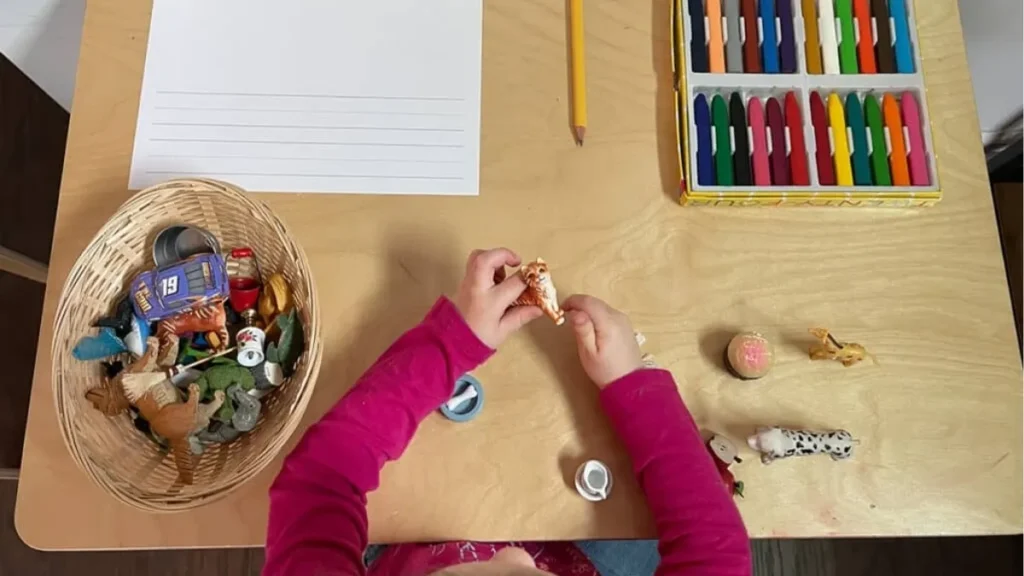Every parent wants their child to thrive. But did you know that strengthening tiny muscles in those little hands lays the foundation for future success?
Fine motor skills are the secret sauce behind tasks like writing, dressing, and even creativity. These fun activities will engage your child while quietly nurturing those all-important skills.
Fun and Educational Fine Motor Activities for Kids
Fine motor skills are all about those tiny muscles in the hands and wrists. They help your preschooler with everything from grasping a crayon to buttoning their coat.
These 10 fun activities use everyday household items to help your child develop these important skills in a playful way.
Activity 1: Playful Picking

Age Group: 3-5 years old
Materials: Dried beans (different colors optional), tongs, two bowls
How to Perform: Fill one bowl with dried beans (bonus points for using different colored beans!). Show your child how to use tongs to pick up the beans one at a time and place them in the empty bowl. This activity strengthens finger muscles, hand-eye coordination, and pincer grasp.
Area of Development: Finger muscles, Hand-eye coordination, Pincer grasp
Activity 2: Lacing Fun

Age Group: 3-5 years old
Materials: Shoelace, colander or cardboard with holes
How to Perform: Find a large colander or piece of cardboard with holes punched in it. Thread a shoelace through the holes. Show your child how to weave the shoelace in and out of the holes, creating a silly design. This activity strengthens finger muscles, hand-eye coordination, and dexterity.
Area of Development: Finger muscles, Hand-eye coordination, Dexterity
Activity 3: Cheerios on a Pipe Cleaner

Age Group: 3-5 years old
Materials: Cheerios (or similar cereal), pipe cleaner
How to Perform: Provide your child with a pipe cleaner and a bowl of Cheerios. Challenge them to thread the Cheerios onto the pipe cleaner, one by one. This activity strengthens hand-eye coordination, pincer grasp, and finger control.
Area of Development: Hand-eye coordination, Pincer grasp, Finger control
Activity 4: Button Sorting Challenge

Age Group: 3-5 years old
Materials: Buttons (different colors and sizes), egg carton or muffin tin
How to Perform: Collect buttons in various colors and sizes. Turn an egg carton or muffin tin upside down to create sorting compartments. Show your child how to sort the buttons by color or size, placing each button in its own compartment. This activity strengthens sorting skills, fine motor skills, and color recognition.
Area of Development: Sorting skills, Fine motor skills, Color recognition
Activity 5: Play Dough Pinch and Poke

Age Group: 3-5 years old
Materials: Play dough, toy tools (plastic knife, rolling pin, cookie cutters)
How to Perform: Play dough is a classic for a reason! It’s a great way to strengthen hand muscles. Provide your child with a ball of play dough and some toy tools like a plastic knife, rolling pin, and cookie cutters. Encourage them to pinch, roll, poke, and squish the play dough to create different shapes. This activity strengthens hand and finger muscles and encourages creativity.
Area of Development: Hand and finger muscles, Creativity
Activity 6: clothes pin Grasp

Age Group: 3-5 years old
Materials: Clothespins (large, colorful), sturdy basket/bowl
How to Perform: Provide your child with a basket or bowl filled with large, colorful clothespins. Encourage them to grasp the clothespins and clip them onto the rim of the basket. This activity strengthens finger muscles and hand-eye coordination, while the bright colors will hold their attention.
Area of Development: Finger muscles, Hand-eye coordination
Activity 7: Spray Bottle Fun
Age Group: 3-5 years old
Materials: Empty spray bottle (cleaned and refilled with water), sponges
How to Perform: Fill an empty spray bottle with water (make sure it’s secure and won’t leak). Provide your child with sponges and show them how to squirt the water from the spray bottle onto the sponges. They can then use the wet sponges to “clean” toys or wipe down surfaces (adult supervision recommended!). This activity strengthens hand muscles, finger control, and coordination.
Area of Development: Hand muscles, Finger control, Coordination
Activity 8: Straw Threading

Age Group: 3-5 years old
Materials: Pipe cleaners (cut into short pieces), straws
How to Perform: Cut pipe cleaners into short pieces. Show your child how to thread the pipe cleaner pieces through a straw. You can use different colored pipe cleaners and straws to make fun patterns. This activity strengthens finger muscles, hand-eye coordination, and dexterity.
Area of Development: Finger muscles, Hand-eye coordination, Dexterity
Activity 9: Treasure Hunt Dig

Age Group: 3-5 years old
Materials: Plastic bin, dry beans, small toys
How to Perform: Fill a plastic bin with dry beans and hide small toys inside. Give your child a spoon or scoop and challenge them to dig through the beans to find the hidden treasures. This activity strengthens hand and finger muscles, grasping skills, and patience.
Area of Development: Hand and finger muscles, Grasping skills, Patience
Activity 10: Paper Tearing Fun
Age Group: 3-5 years old
Materials: Construction paper (different colors)
How to Perform: Provide your child with sheets of construction paper in different colors. Show them how to tear the paper into small pieces. They can tear strips, squares, or even create confetti! This activity strengthens finger muscles and dexterity while encouraging creativity.
Area of Development: Finger muscles, Dexterity, Creativity

Conclusion
By incorporating these playful activities into your day, you’ll be not only keeping your child entertained, but also setting them on the path to mastering those essential fine motor skills.
Remember, play is the language of children, and through play, they’ll develop the confidence and dexterity needed to flourish in all areas of life.
Also Read:
- Are All Montessori Schools Catholic? (A Quick Answer)
- What Age Does Montessori End (Start, Finish & Best Years)
- Why Montessori is Bad? – A Comprehensive Answer